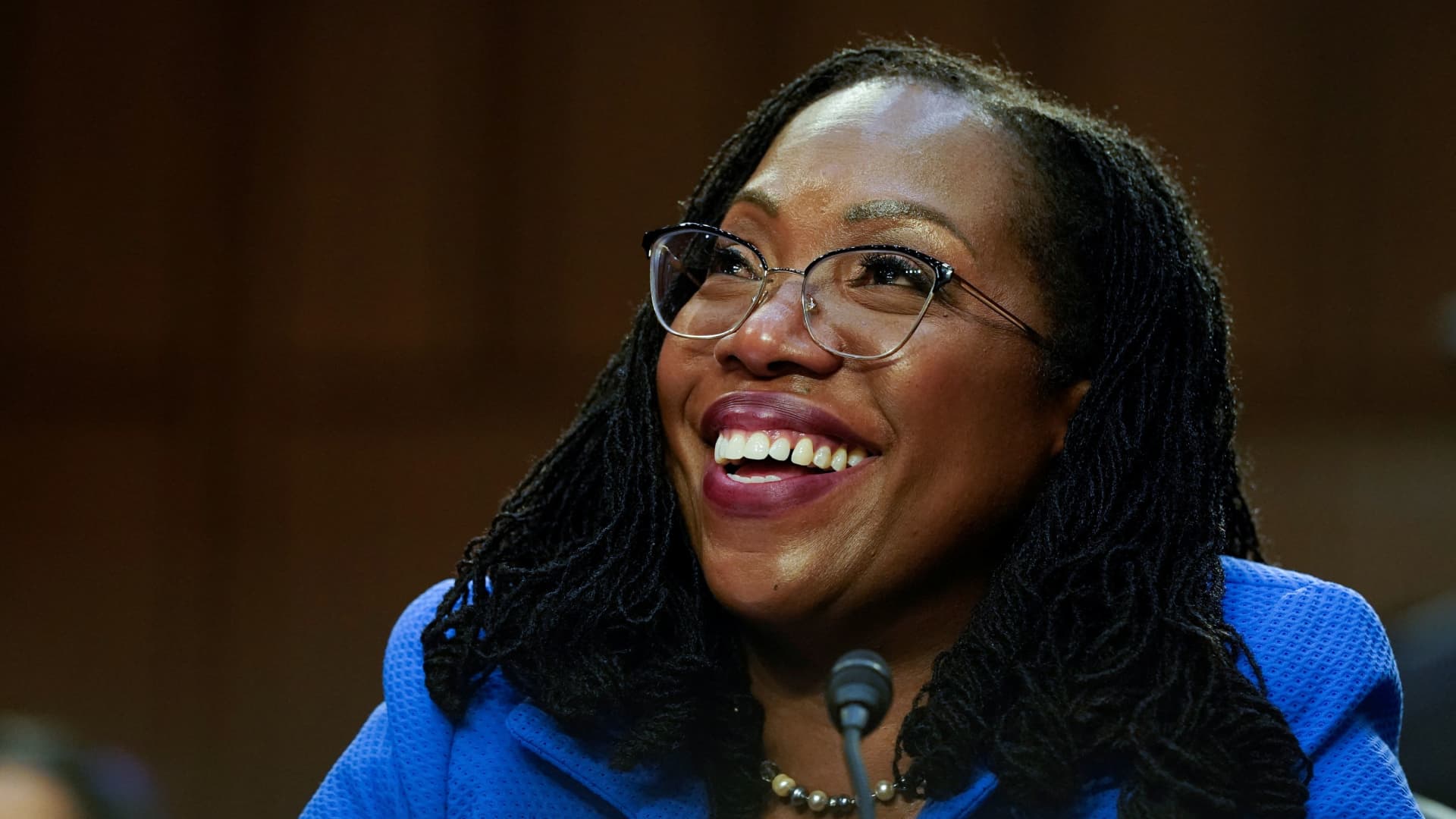Supreme Court nominee Ketanji Brown Jackson’s confirmation hearings concluded Thursday, bringing her one big step closer to becoming the first Black woman to sit on the nation’s top court.
Jackson, a 51-year-old federal judge and President Joe Biden’s first Supreme Court pick, will likely have to wait at least two weeks before the Senate votes on her confirmation. But her performance in the hearings only appeared to make Democrats more confident that her nomination will prevail.
Jackson can win confirmation with the support of merely 50 senators in the evenly split chamber, where Vice President Kamala Harris holds the tie-breaking vote. No Democrats have signaled they will vote against her.
The Senate Judiciary Committee aims to vote on Jackson’s nomination on April 4, Chair Dick Durbin, D-Ill., said Wednesday evening. If it passes, the nomination will move to a final vote in the full Senate.
Senate Majority Leader Chuck Schumer, D-N.Y., said Thursday that he will push “to have her nomination come to the floor in short order.” The Senate “is on track” to confirm Jackson “by the end of this work period,” or an April 8 deadline, he added.
The hardest part, for Jackson at least, appears to be behind her. Over two grueling days of hearings, Jackson endured more than 23 hours of questioning from the Senate Judiciary Committee that at times appeared hostile — and occasionally grew emotional.
Jackson and her husband, who sat behind her throughout her appearances before the committee, both teared up after Democratic Sens. Cory Booker of New Jersey and Alex Padilla of California praised her historic nomination.
“I hope to inspire people to try to follow this path, because I love this country, because I love the law, because I think it is important that we all invest in our future,” Jackson said while wiping her eyes at one point late Wednesday.
Republican members grilled Jackson on her lengthy resume, as well as a range of conservative wedge issues with tenuous connection to her nomination, such as critical race theory and transgender rights.
They focused by far the largest part of their scrutiny on Jackson’s sentencing record in a handful of cases involving crimes related to child pornography.
GOP senators have suggested Jackson’s record shows a pattern of being too lenient in sentencing child-porn offenders, though fact-checkers have disputed those characterizations.
Jackson maintained a deliberate speaking pace and rarely raised her voice throughout both days of hearings. She did show increasing hints of exasperation as Republican members spent hours on the child-porn cases.
In one exchange, Tom Cotton, R-Ark., asked Jackson if she regretted one such sentencing decision. The judge replied: “What I regret is that in a hearing about my qualifications … we’ve spent a lot of time focusing on this small subset of my sentences.”
The panel’s Democrats heaped praise on Jackson, defended her against the criticism and at times seethed about her treatment by Republicans. Jackson on multiple occasions sat silently while members sparred over the nature of the questions being asked, as well as Republicans’ efforts to view sensitive private information about the disputed child-porn cases.
Members of the American Bar Association, which unanimously awarded Jackson its top rating of “Well Qualified,” also pushed back on criticism of Jackson’s sentencing record during their testimony in Thursday’s hearing.
The fourth and final day of hearings in the Judiciary Committee gaveled out nearly one month after Biden announced Jackson as his nominee. Before the public hearings began, Jackson met with senators of both parties individually behind closed doors. Virtually all of them offered compliments following their meetings with the judge.
But it was unclear if Jackson will receive any support from Republicans when it comes time to vote.
Jackson garnered bipartisan approval when Biden nominated her to the U.S. Court of Appeals for the District of Columbia Circuit less than a year earlier. Sen. Lindsey Graham of South Carolina was one of three Republican senators to vote with all Senate Democrats to confirm her.
But during her Supreme Court confirmation hearings, Graham transformed into one of Jackson’s most hostile critics. He repeatedly interrupted her answers, aggressively relitigated her child-porn sentencing record and at one point accused her of judicial “activism” in a past ruling in an immigration case.
Democrats will also watch Sens. Susan Collins, R-Maine, and Lisa Murkowski, R-Alaska, the other two GOP members who voted to confirm Jackson last year.
Senate Minority Leader Mitch McConnell, R-Ky., said Thursday that he would oppose Jackson’s nomination.
“I went into the Senate process with an open mind, but after studying the nominee’s record and watching her performance this week, I cannot and will not support Judge Jackson for a lifetime appointment to the Supreme Court,” he said on the Senate floor.
